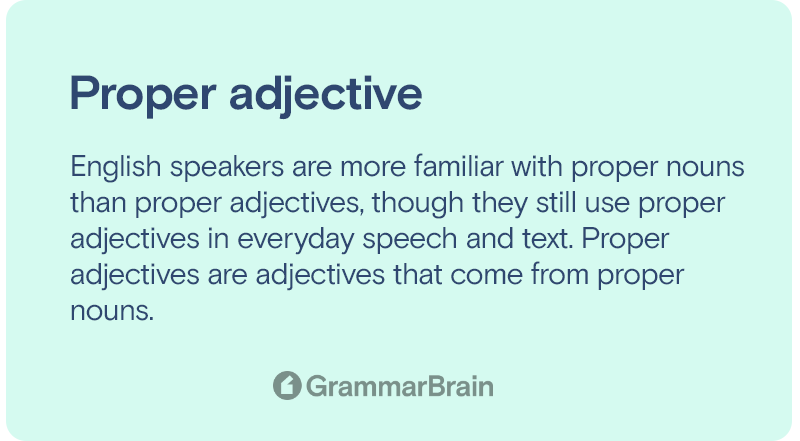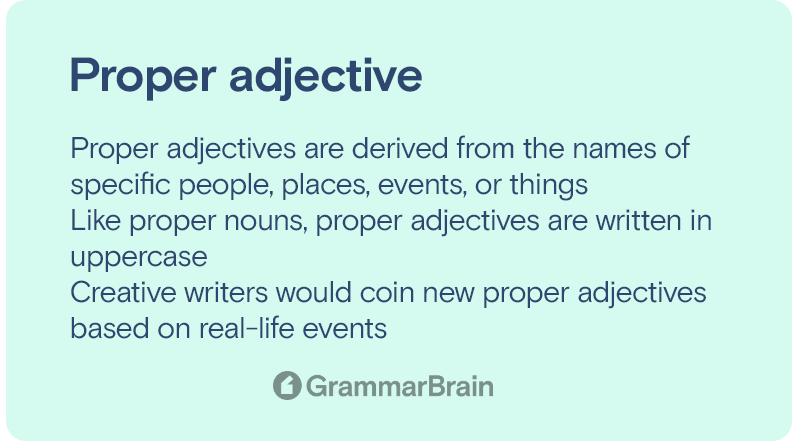What are proper adjectives? How do proper adjectives work? English speakers are more familiar with proper nouns than proper adjectives, though they still use proper adjectives in everyday speech and text. Proper adjectives are adjectives that come from proper nouns.
Proper nouns, as may already know, refer to the specific names of people, things, and animals. Adjectives derived from these names are called proper adjectives.
Here’s a quick example:
- Russia: proper noun
- Russian: proper adjective

Common adjectives vs proper adjectives
Most adjectives are common adjectives. Adjectives are words that describe nouns.
Consider the following example:
- She was wearing a red sweater.
In this sentence, the adjective red describes the color of the weather. Red is a common adjective – it’s not derived from a proper noun, and it describes a generic color.
Proper adjectives, on the other hand, describe specific features of a noun.
Here’s an example:
- Moving to a new country is a Herculean task.
Herculean is a proper adjective since it comes from the noun Hercules. We can substitute Herculean with difficult, challenging, arduous, or any synonym of these words. But when we use the proper adjective Herculean, we are referring to the qualities of the Greek mythological Hercules. Proper adjectives are also used as literary devices in prose and verse.

Features of proper adjectives
The key features of proper adjectives differentiate them from common adjectives:
- Proper adjectives are derived from the names of specific people, places, events, or things
- Like proper nouns, proper adjectives are written in uppercase
- Creative writers would coin new proper adjectives based on real-life events
- In writing, proper adjectives often demonstrate creativity and depth of knowledge
Identifying proper adjectives is easy. An adjective in uppercase that sounds like a name of a person, thing, or event is likely to be a proper adjective.
Let’s explore a few cases of creative use of proper adjectives before going into the more obvious ones:
- This is a characteristic Trumpian Tweet.
- The Putinist policies are widely criticized.
- The Nadalesque style of tennis is gaining traction.
We can see from the above examples that the three proper adjectives are derived from the names of three prominent people (person, place, or thing):
- Donald Trump (ex-president of the United States)
- Vladimir Putin (president of Russia)
- Rafael Nadal (tennis player)
There’s considerable creative freedom in the English language when it comes to forming proper adjectives. We can use topical events to create our own proper adjectives. However, these adjectives are relevant only to people who also have the same cultural backdrop and knowledge.
For example, the proper adjective Gandhian is common in political contexts since it’s derived from the name Mahatma Gandhi. But if someone isn’t familiar with Mahatma Gandhi or the Indian Independence Movement, they may not recognize the meaning of the word.
Contextual use of proper adjectives
Not all proper adjectives are universally recognized. When using a proper adjective in specific contexts, make sure the reader or listener is also aware of the backdrop. Otherwise, it can create confusion and incoherence in both speech and writing.
Proper adjectives: Examples of Proper Adjectives
Proper adjectives are derived from proper nouns. Let’s check out examples of each type.
Proper adjectives from the names of people
Shakespeare > Shakespearean
Elizabeth> Elizabethan
Kafka > Kafkaesque
Gandhi > Gandhian
Darwin > Darwinian
Machiavelli > Machiavellian
Lenin > Leninist
Orwell > Orwellian
Marx > Marxist
Thatcher > Thatcherite
Buddha > Buddhist
Christ > Christian
Confucius > Confucian
Hercules > Herculean
Victoria > Victorian
Jackson > Jacksonian
Abraham > Abrahamic
Euclid > Euclidean
Freud > Freudian
Note: We can derive proper adjectives from any name as long as they fit a broad cultural context.
Proper adjectives from the names of countries
We can get proper adjectives from the name of any country. Here are some examples, but this list is only indicative and not exhaustive:
America > American
Jamaica > Jamaican
England > English
Ireland > Irish
Scotland > Scottish
Wales > Welsh
France > French
Spain > Spanish
Portugal > Portuguese
Italy > Italian
Germany > German
Netherlands > Dutch
Belgium > Belgian
Luxembourg > Luxembourgian
Switzerland > Swiss
Austria > Austrian
Czech Republic > Czech
Slovakia > Slovak
Hungary > Hungarian
Poland > Polish
India > Indian
Pakistan > Pakistani
Proper adjectives from the names of places (not countries)
We can also get proper adjectives from the names of specific places like regions, cities, and continents.
Himalaya > Himalayan
Alps > Alpine
Atlantis > Atlantis
Europe > European
Asia > Asian
Toronto > Torontonian
Polynesia> Polynesian
Middle East > Middle Eastern
Bali > Balinese
Delhi > Delhiite
Proper adjectives with prefixes
We can also form proper adjectives using prefixes like pan-, post, and pre-. Here are some examples:
pan-African
pre-Columbian
post-war
post-modern
post-structuralist
post-colonial
anti-apartheid
pro-democracy
Merging two names:
Austro-Hungarian
Afro-Caribbean
Indo-Chinese
Hyphenated proper adjectives
Proper adjectives can be hyphenated as well. For example:
Spanish-speaking
English-speaking
How to use proper adjectives in sentences
Use proper adjectives just like common adjectives while writing or speaking. The role of an adjective is to describe or define a noun. Proper adjectives play the same role in spoken and written English.
However, always capitalize proper adjectives while writing. There are some exceptions, like gargantuan (from Gargantua), and draconian (from Draco). But in most cases, proper adjectives are capitalized.
Let’s check out some examples of how to use proper adjectives in sentences:
- She had a Shakespearean way with words.
- My uncle was a true Elizabethan gentleman.
- Our professor was a Leninist in her beliefs.
- They had a very Victorian relationship.
- His Freudian analysis of her was spot on.
- The British man walked into the Indian restaurant and asked for a table for one.
- I have a Portuguese friend.
- We were thinking about having Asian food.
- The Australian accent is difficult to decipher.
- Joao is a Spanish gentleman who has been working with me for years.
- The Alpine landscape left us awestruck.
- If you want to learn about life, go to the Himalayan monks.
- The anti-racism movement faced steep challenges.
- There’s very little to look forward to in a post-modern world.
- Indo-Chinese cuisine is one of the best in the world.
Conclusion
Proper adjectives enrich the English language in several ways. Learning how to use them can a person a better writer and speaker.
FAQs
What is a proper adjective?
A proper adjective is an adjective derived from a proper noun, such as Leninist, Gandhian, Elizabethan, Kafkaesque, etc.
Proper adjective examples:
- Moving to a new country is a Herculean task.
Are proper adjectives always capitalized?
Except for words like gargantuan and draconian, proper adjectives are always written in uppercase. Even these exceptions can be written in uppercase.
When do we use proper adjectives?
Use proper adjectives when they are necessary (He is a Russian man), or when it serves a purpose in speech/writing (It’s a Herculean task).
Can we create our own proper adjectives?
Established writers, publication houses, etc. often take the creative liberty of coining new proper adjectives.
Do proper adjectives have suffixes?
Yes, some proper adjectives have suffixes, e.g., English-speaking, Russian-speaking
Do proper adjectives have prefixes?
Yes, some proper adjectives have prefixes, e.g., post-colonial, pre-American, anti-western
Can proper adjectives be hyphenated?
Yes, examples of hyphenated proper adjectives are Indo-Chinese, Afro-Caribbean, Middle-Eastern, Austro-Hungarian
Do proper adjectives begin with a capital letter?
Yes. Proper nouns and proper adjectives start with a capital letter. Many proper adjectives are formed using the names of countries, religions, or names of people. The word “country” is a common noun and does not get capitalized, for example.
What does a proper adjective do?
A proper adjectives (modifies) a noun. Proper adjective examples:
- She had a Shakespearean way with words.
- My uncle was a true Elizabethan gentleman.
- Our professor was a Leninist in her beliefs.
Is a name of a person a proper adjective?
No it is a proper noun. A particular person is a proper noun. The proper adjective describes (modifies) the noun. What makes proper adjectives unique is that they are formed from proper nouns.
Sources
- Proper Adjectives | Grammar | EnglishClub
- What Is A Proper Adjective? | Thesaurus.com
- What Is a Proper Adjective? (yourdictionary.com)
Inside this article
Fact checked:
Content is rigorously reviewed by a team of qualified and experienced fact checkers. Fact checkers review articles for factual accuracy, relevance, and timeliness. Learn more.
Core lessons
Glossary
- Abstract Noun
- Accusative Case
- Anecdote
- Antonym
- Active Sentence
- Adverb
- Adjective
- Allegory
- Alliteration
- Adjective Clause
- Adjective Phrase
- Ampersand
- Anastrophe
- Adverbial Clause
- Appositive Phrase
- Clause
- Compound Adjective
- Complex Sentence
- Compound Words
- Compound Predicate
- Common Noun
- Comparative Adjective
- Comparative and Superlative
- Compound Noun
- Compound Subject
- Compound Sentence
- Copular Verb
- Collective Noun
- Colloquialism
- Conciseness
- Consonance
- Conditional
- Concrete Noun
- Conjunction
- Conjugation
- Conditional Sentence
- Comma Splice
- Correlative Conjunction
- Coordinating Conjunction
- Coordinate Adjective
- Cumulative Adjective
- Dative Case
- Determiner
- Declarative Sentence
- Declarative Statement
- Direct Object Pronoun
- Direct Object
- Diction
- Diphthong
- Dangling Modifier
- Demonstrative Pronoun
- Demonstrative Adjective
- Direct Characterization
- Definite Article
- Doublespeak
- False Dilemma Fallacy
- Future Perfect Progressive
- Future Simple
- Future Perfect Continuous
- Future Perfect
- First Conditional
- Irregular Adjective
- Irregular Verb
- Imperative Sentence
- Indefinite Article
- Intransitive Verb
- Introductory Phrase
- Indefinite Pronoun
- Indirect Characterization
- Interrogative Sentence
- Intensive Pronoun
- Inanimate Object
- Indefinite Tense
- Infinitive Phrase
- Interjection
- Intensifier
- Infinitive
- Indicative Mood
- Participle
- Parallelism
- Prepositional Phrase
- Past Simple Tense
- Past Continuous Tense
- Past Perfect Tense
- Past Progressive Tense
- Present Simple Tense
- Present Perfect Tense
- Personal Pronoun
- Personification
- Persuasive Writing
- Parallel Structure
- Phrasal Verb
- Predicate Adjective
- Predicate Nominative
- Phonetic Language
- Plural Noun
- Punctuation
- Punctuation Marks
- Preposition
- Preposition of Place
- Parts of Speech
- Possessive Adjective
- Possessive Determiner
- Possessive Case
- Possessive Noun
- Proper Adjective
- Proper Noun
- Present Participle
- Prefix
- Predicate



